“There is magic in games. Games are magic in the way that first kisses are magic, the way that finally arriving at a perfect solution to a difficult problem is magic, the way that conversation with close friends over good food is magic. The magic at work in games is about finding hidden connections between things, in exploring the way that the universe of a game is structured. As all game players know, this kind of discovery makes for deeply profound experiences” – Tracy Fullerton
The games industry is one of the most rapidly-changing industries out there. Composed of passionate people who want to create fun and long-lasting experiences for all players in the world, this industry has now become a target of Blockchain technology evangelists, with far-fetched ideas on how to merge these two strange worlds. It seems like the time has come for NFTs to cross paths with games, whether the industry is ready for them or not.
We split this section into three parts so we can focus on the specifics of each, but a common point underlying all three is that this discussion affects the industry as a whole, and therefore affects players most. It’s imperative that all voices are being heard and that we can conduct conversations around NFTs in the most transparent and inclusive way possible. Game development is a team effort, collaboration is at the core of this craft, and we thrive when we work together towards the same goals.
One facet of this debate includes analyzing how solid the base of this new technology is, since it emerged from the cryptocurrency environment, known for its volatility and general vulnerabilities. We are talking about something that will deeply affect our industry in the long term, potentially changing the core of what it means to play. A safe way to conduct this debate is having a flat discussion with all involved parties so a consensus can be formed and a general agreement can be formulated – whether it is in favor of or against it. If this decision is made from the top down and merely communicated to all people involved, it risks creating a cascading controversy, generating frustration for all people involved – company, developer, and community.
Company Sentiment
Here is a sample of the public studio stances we have seen as of April 2022:
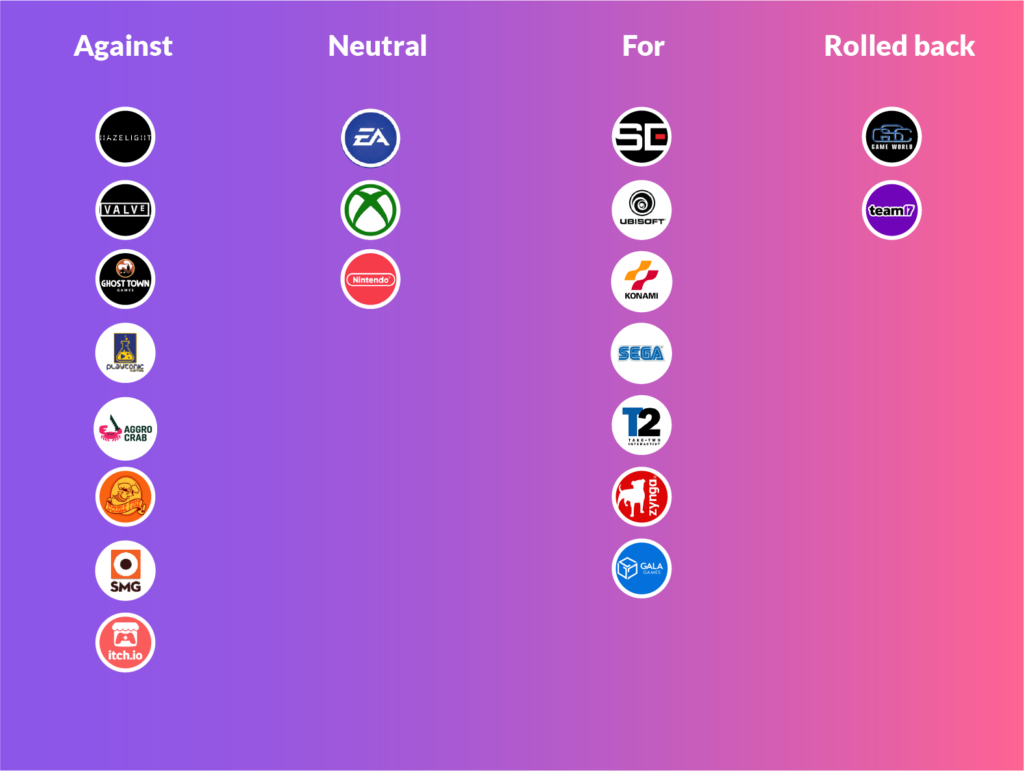
From the first time we heard the term NFT it’s been a waiting game to hear stances from different game studios, in what almost feels like a coin flip. One never knows if their favorite game studio will send out a public letter in favor of NFTs or make a bold statement against them. Most studios are staying somewhere in between – they don’t reject the idea but also don’t embrace it. That is the case of EA Games, showing themselves open minded to the idea but not fully embracing it, Xbox, showing skepticism but mentioning ‘we’re in a journey of people figuring it out’ and Nintendo, admitting they have interest in the area but wonder what joy it could bring for players. For those companies, the claim is that it’s still too early to make a decision, with many factors to be considered and research to be done.
Some studios have made their stances public, which is the case of Ubisoft, one of the earliest adopters to implement NFTs in their game Tom Clancy’s Ghost Recon Breakpoint. This announcement triggered a series of controversial events like removing their Ubisoft Quartz announcement video on YouTube after it was showered with 40,000 dislikes and rewarding developers with NFTs as a token of appreciation for their hard work.
Konami expressed interest in NFTs and already auctioned Castlevania content in its commemorative 35ths anniversary on the trading platform OpenSea, including original pixel art and music. Peter Molyneux, known for Fable, announced he is working with Gala Games on an upcoming NFT game called Legacy. Square Enix published this open letter in 2021 informing their intentions to adopt blockchain-based technologies in their games, followed by SEGA, Take-Two and Zynga.
Award winning studio Hazelight openly criticized NFTs while also ensuring they will never do it in their games, accompanied by Valve, Ghost Town, Platytonic, Aggro Crab, Double Fine, SMG Studio and Itch.io. Read more about Valve’s thought process here.
GSC Game World is a roll-back case: the studio announced they would incorporate NFT in the upcoming S.T.A.L.K.E.R. game and canceled the plans after met with massive backlash. Another studio that pulled back after the announcement of an NFT project is Team17, who put an end to their Metaworms project after it was met with substantial criticism from both community and partners who began dropping out. Both announcements were a PR nightmare and the studios experienced internal turmoil in addition to public criticism.
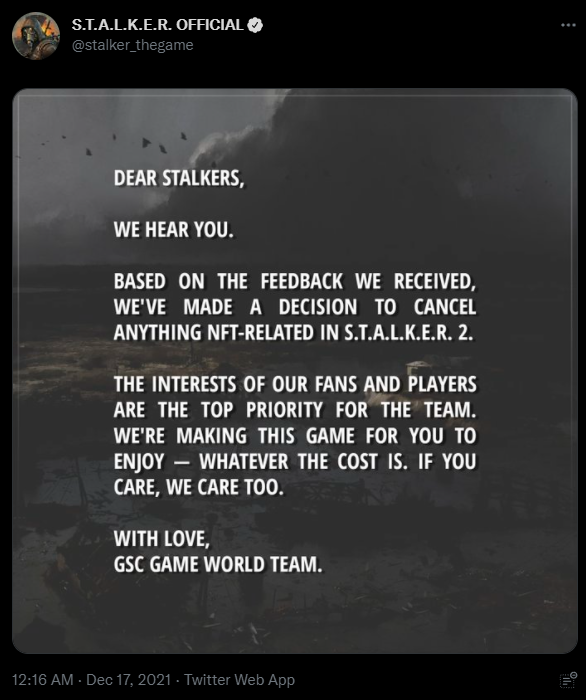
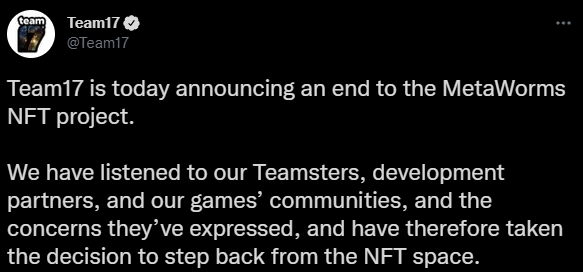
This trend of “just kidding” style reverts of NFT announcements repeated in other industries, from professional soccer team Barcelona FC to the massively popular gaming chat platform Discord, online art portfolio platform Artstation to wildlife non-profit WWF. These sharp 180s shine a light into community sentiment, a subject we will talk about in the next section, and how taking a pro-NFT stance can create a wave of negative sentiment towards studios and games that make decisions without considering their player base, their support community, and how they will be perceived by the general public.
It’s safe to say that most game studios are being cautious around NFTs and blockchain technology, with a minimal number of them actually implementing this tech into games at the moment. There is an undeniable pressure to at least talk about this subject, though, since it’s the buzzword of the moment. It is possible that there is a fear of missing out factoring into this, with the pressure coming from several different vectors, internal and external.
The Independent Games Developers Association (IGDA), in partnership with its own Climate Special Interest Group, issued a public statement in July 2021, calling for: “developers to halt the use of Non-Fungible Tokens (NFTs) in singular ecosystems and to use Proof of Stake (PoS) for cross-ecosystem NFTs. NFTs should never be used when a simple and far less costly database table can be managed to provide the same information and benefits.” While more evidence has come to light showing that even PoS blockchains are harmful, this early statement clearly shows that some games industry professional bodies are keen to stop ecologically-harmful uses of technology.
With all that said, one cannot deny the rampant feeling of polarization that manifests from this debate, fueled by inflamed opinions on social media. This is detrimental to an industry that thrives on creativity, shared knowledge, and collaboration.
Developer Sentiment
“If games are spaces where meaning is made, game developers are the meta creators of meaning, those who architect the spaces of possibility where such discovery takes place” – Tracy Fullerton
For most people working in the games industry, conversations about NFTs have emerged with colleagues and teammates even though studios might not have touched upon the subject officially. Much of this sentiment is a general sense of confusion, because developers have a deep understanding of how games work and it’s proven challenging to find any scenario in which an NFT would add or solve something that hasn’t already been done or solved before with existing technologies. We’ve also seen a lot of frustration, as developers are not being included in all the conversations about this subject, with some studios even quietly working on NFT projects without their staff’s knowledge. This quiet top-down approach creates feelings of hopelessness in game developers – meaningful changes are being made and the people who make the games are not even involved in the discussion.
Case Study: Ubisoft
A concrete case that illustrates this scenario is that of Ubisoft. The studio announced their imminent NFT initiative called Ubisoft Quartz to the public without the knowledge of most, if not all, developers. Their internal message board filled up with questions and concerns from employees who did not understand what was going on, how the decision would impact their daily tasks and the games they work on, and exactly why this choice was made. A few weeks after the initial announcement, the studio shared a memo on their internal messaging platform that was met with intense pushback by employees, who left hundreds of harsh comments that ranged from disappointment to embarrassment. The studio updated their memo later to include that they will address current limitations and risks, but no real conversation has been with the developers beyond that.
Case Study: Team17
A similar situation unfolded in Team17, the development studio behind the beloved Worms and Overcooked 2 games and publisher to titles like Yuko’s Island Express. The studio stunned employees with a public announcement of MetaWorms memorabilia NFT, a project that was being quietly developed internally without the knowledge of most employees except for a few who did know for operational reasons. Those who were aware of it expressed their concerns, only to be ignored, and those who didn’t know about it were shocked and quite upset about the project and the way the studio handled it. After the disastrous announcement, the studio backtracked due to massive public opposition and partners dropping out. Among those were AGGRO CRAB, Playtonic and Overcooked. Internally, an apology was made during a town hall, but employees were still deeply hurt by the episode and couldn’t help but attest to the fact that the studio was out of touch with their staff and refused to listen to their concerns or to invite them to the discussion.
What are developers saying?
A good place to start analyzing general developer sentiment is the latest State of the gaming industry survey circulated by GDC in 2022:
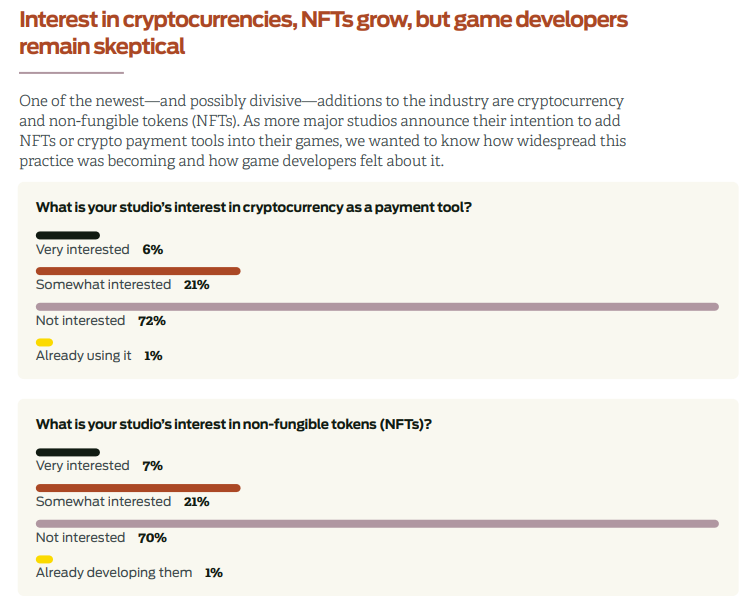
This section of the survey asked developers about their opinions and their studio’s interest in cryptocurrencies and NFTs – showing that a majority of 70% has no interest in either of those, and only 1% of the studios have already implemented such technologies in their published games. In the same survey, some quotes have been highlighted:
“It’s the wave of the future.”
“How this hasn’t been identified as a pyramid scheme is beyond me.”
“I think it is a tech looking for a purpose. People will be interested in it as a gamble to make money, but there’s not enough of a public demand for it to be an actual currency.”
“Why do we need them? What benefit does it have putting these systems into our games? Who is using these things? It feels like a very small audience. And also, these technologies are still not using sustainable energy and are a target for money laundering. As a developer I feel deeply uncomfortable that there is a push for these. It feels entirely fueled by greed for more money because we read stories about crypto millionaires, when in reality all of it is extremely unstable and unethical.”
“We should collectively agree to ban the use of blockchain-based technologies in our industry because of their hugely negative environmental impact.”
“Blockchain is a foundational technology that will transform organizations and accountability, but NFTs and cryptocurrencies in general are a scam.”
“I think this is going to be a massive shift in the way we think about digital goods and ownership/monetization.”
Besides the GDC survey, many Twitter threads and YouTube videos made by game developers have been circulating with different points of view and arguments, but tied with a common sentiment:
games don’t need NFTs
It could even disrupt some game components such as delicately-balanced economies and the ability to push improvements or fixes into game objects. You can watch industry veteran Christopher Naatsuume talk about it here and here, read Jason Schreier’s journalistic coverage here, read Rami Ismail walking us through a dice implementation example to explain what is wrong with NFT interoperability here, or read this artist- and developer-centric explanation by Xavier CK about why NFT portability is not viable for big games.
Most arguments to include NFTs in games come from NFT game studios, evangelists, crypto investors, and early adopters. Few, if any, have come from game developers when talking about what’s best for games and players. Even though we are considering short and mid-term integration impacts, it’s imperative to raise this debate about what the real motivations and benefits for the industry and players would be in the long-term, because this technology will change the industry fundamentally and have long-lasting effects. Choosing to focus the next five years of the industry’s research and development efforts in NFT marketplaces also means that we are neglecting important research that could actually bring meaningful value to gameplay and beneficial progress to the industry itself.
In short, industry-wide developer sentiment is not split; there is a consensus that this technology doesn’t bring any new benefits to games. Developer voices are not being heard in these conversations, nor are developers being invited to participate in the debate at studios, which goes back to our initial point: this is a conversation in which all voices need to be heard and decisions need to be taken together. We implore decision-makers to include developers in these conversations, as they hold the deepest knowledge of the games themselves, keep the player’s interests first, and hold the industry’s health as a priority.
Community Sentiment
For the purposes of this analysis, we will consider Community the collection of a game’s player base, content creators, fans, and enthusiasts. A game can exist by itself, but it only comes to life through its community.
Players have been the first ones to express skeptical feelings towards NFTs in games, since for them NFTs appear more like a profit move instead of something done to improve player experience or raise gameplay quality. For every public announcement from a game company announcing NFTs, that game’s community has been vocal in expressing their disapproval quite passionately. This has left game companies stunned with public opposition, causing some to even backtrack after announcements.
To some extent, players and studios have been living in a delicate balance ever since new monetization formats started appearing, most notably microtransactions, a model that generated waves of controversy in the community ever since its first appearance around 2006. Microtransactions involve selling additional game content and assets, sometimes in a chance-based mechanism called loot boxes. Some governments have banned the presence of microtransactions and loot boxes due to their gambling similarity and potential for preying on younger audiences.
When NFTs in games were first announced, it may have felt like whiplash for players, as none of these announcements appeared to be about improving player’s experiences or creating better game content, but rather about offering a new ‘economic model’ with players as stakeholders.

These announcements led many community members to feel this was simply a new way to encourage players to spend money disguised as a paradigm shift.
Some of the statements made by gamers in this New York Times article are enlightening:
“It’s so obviously being done for profit instead of just creating a beautiful game”
“I just hate that they keep finding ways to nickel-and-dime us in whatever way they can”
“I don’t see anywhere mentioning how that benefits the gamer, how that improves gameplay. It’s always about, ‘How can I make money off this?’”
“We’ve been here before”
When Ubisoft first announced their NFT project Ubisoft Quartz, their YouTube video announcement gathered almost 40 thousand dislikes in a short amount of time, making for 96% of dislikes, and was subsequently unlisted on YouTube:
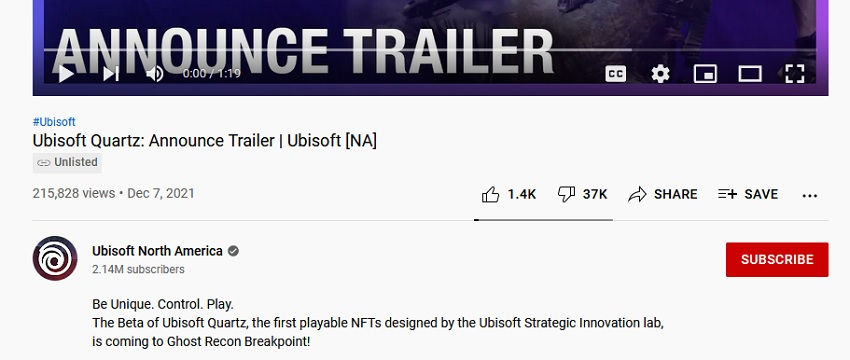
The same announcement on Twitter gathered some disapproval from users:



Digging into some of the public announcement posts online, it also becomes clear that there is a subset of the public that is enthusiastic about NFTs making their way into games:
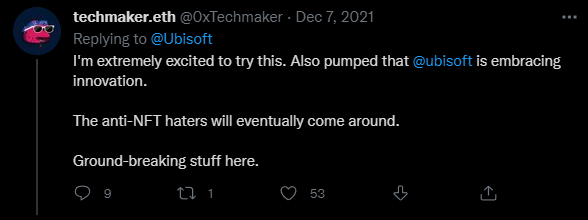
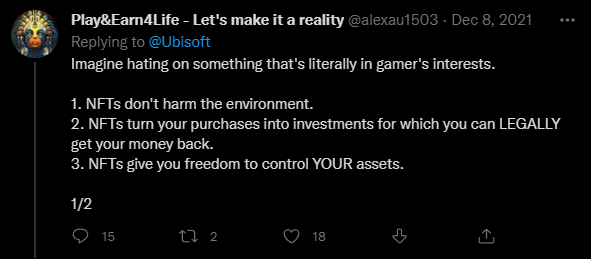
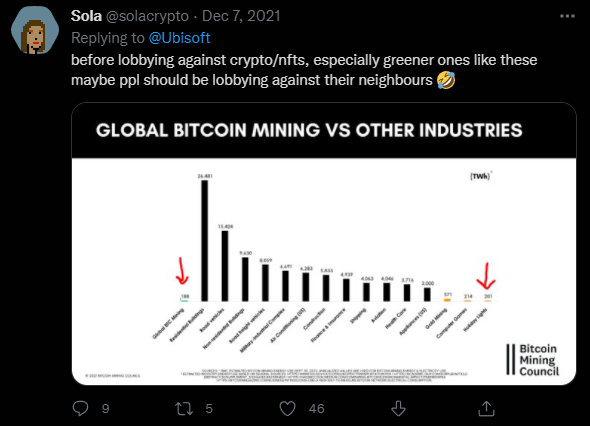
The same trend repeats itself in the S.T.A.L.K.E.R. NFT announcement tweet:
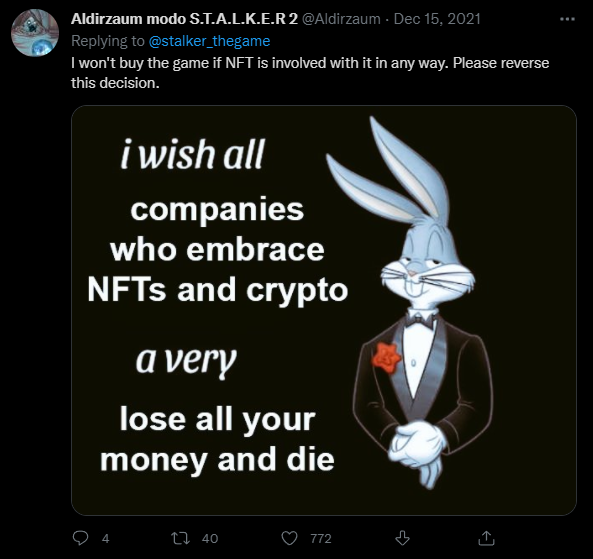
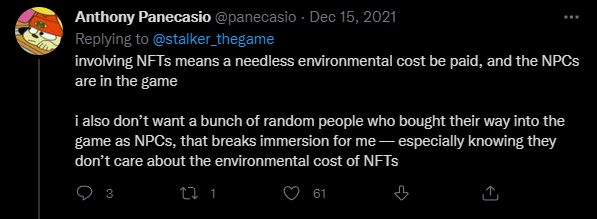


And in the Metaworms cancelation tweet the discussions are even more inflamed:



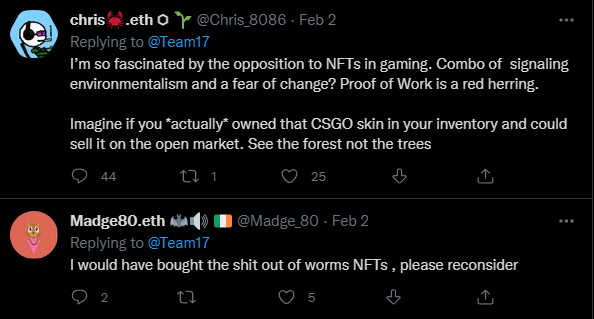
A Polarized Community
It’s very common to find polarized opinions in NFT project’s announcement posts: on one side “traditional” gamers showing skepticism and on the other side cryptocurrency enthusiasts. It’s easy to spot cryptocurrency enthusiasts because there is a strong sense of community among them, so it’s common to have an explicit indication in the username like ‘.eth’, ‘play-to-earn’ or ‘crypto’; the rocket emoji that alludes to the idiom ‘’to the moon’’, a catchphrase used heavily in the crypto community; and most recently the hexagonal NFT profile image feature enabled by Twitter. You can learn more about the crypto community culture here. This pattern repeats itself in all public announcements made on Twitter.
According to some studios, this backlash was expected, and studio executives blame it on the fact that the concept of digital ownership and NFTs is hard to grasp. In this recent interview, an Ubisoft representative recognizes the public opposition but believes that players “don’t get what a digital secondary market can bring to them.”
Other studios are interested in catering to a new player base, formed of Play-to-Earn enthusiasts, regardless of how their original players feel. This appears to be true for Square Enix, as openly stated in this public letter from their president:
I realize that some people who ‘play to have fun’ and who currently form the majority of players have voiced their reservations toward these new trends, and understandably so. However, I believe that there will be a certain number of people whose motivation is to ‘play to contribute,’ by which I mean to help make the game more exciting.
NFTs threaten to fundamentally change the core of what games are, and what motivates people to play. Game companies and developers should listen to their players before making any decisions that stand to impact their gaming experience in such a significant way. In doing so, the gaming industry and our community can keep growing and sharing transformative experiences together.